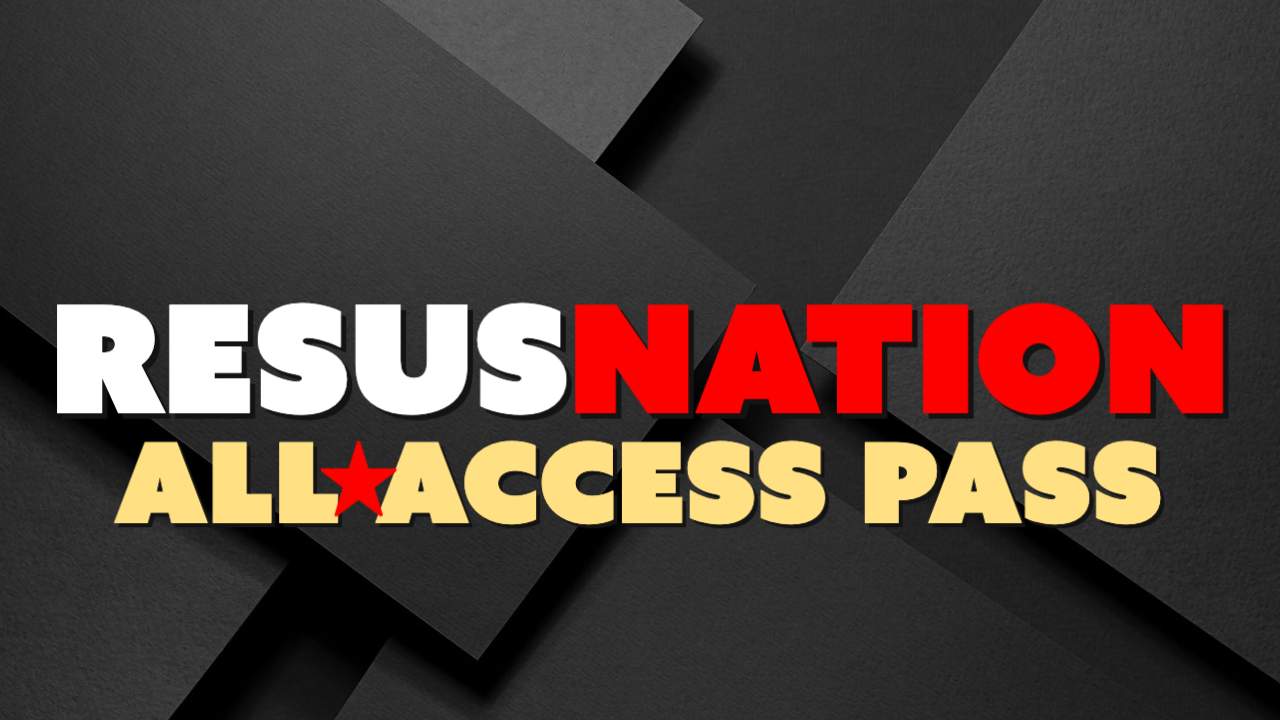
We covered a lot of stuff last week, we thanked Nurses, we had a little fun, we reviewed ABGs and pulse oximetry, we talked about stress and there was more. Here’s what happened last week:
- A video to thank Nurses and a video demonstrating my mood on a slow consult day
- A comparison of ABG vs. VBG and why pulse oximetry is so good
- A video on phenobarbital in alcohol withdrawal syndrome
- An announcement for the next grand rounds on transvenous pacing
- A new podcast on stress inoculation by Anand Swaminathan.
There’s no time to waste, it’s time for Last Week Now!
Last week I hope you thanked a Nurse, because they are vastly under appreciated and need more praise. I made a little video to say thanks. I also made another little video representing my mood on slow consult shifts....based on the comments, I'm not alone in this sentiment. Enjoy these videos from last week.
ABG vs. VBG ?
Josh Farkas (@PulmCrit) is a very smart dude and he an evidence based educator. He recently posted somethings that I am quite passionate about, and that's the lack of need for an ABG in most clinical situations. This is mostly predicated on the fact that pulse-oximeters are very good. Click the link below for the full-post, but I've included the main summary posts here.
Assessment of oxygenation
- Pulse oximetry is the preferred tool for assessing oxygenation due to its numerous advantages over arterial blood gas (ABG).
- Pulse oximetry provides continuous oxygen saturation values, making it a better measurement of oxygen delivery to the tissues compared to PaO2.
- ABG, often obtained through an invasive and time-consuming process, may provide an inferior evaluation of systemic oxygen delivery as it estimates oxygen saturation based on pO2 measurements.
Advantages of pulse oximetry over ABG:
- Pulse oximetry is non-invasive, painless, and provides immediate results, making it a more convenient and cost-effective option.
- It offers thousands of data points within a short time frame, allowing for better monitoring of oxygenation compared to intermittent ABG measurements.
- Pulse oximetry values are less likely to induce unnecessary anxiety, as PaO2 values often appear lower despite reasonable oxygen saturation levels.
Situations where ABG is needed:
- Poor arterial waveform and dyshemoglobinemia can render pulse oximetry unreliable, necessitating ABG analysis to evaluate oxygenation.
- The P/F ratio (PaO2/FiO2 ratio) is used in ventilated patients to assess oxygenation and may require ABG measurement.
- The A-a gradient, measuring the difference between inspired PO2 and patient's PaO2, helps assess lung function and can be determined through ABG.
Limitations of ABG/VBG:
- ABG/VBG values often exhibit random variation and may not accurately reflect a patient's overall condition, making continuous monitoring with pulse oximetry more valuable.
- ABG/VBG is a poor tool for differentiating causes of respiratory distress, as values tend to be similar regardless of etiology.
- ABG/VBG is useful for evaluating hypercapnia, such as in patients with COPD, encephalopathy, or those receiving sedation during BiPAP treatment.
Considering the practicality and reliability of pulse oximetry, it is recommended as the default tool for assessing oxygenation. ABG should be reserved for specific situations where pulse oximetry may be inaccurate or insufficient in providing the necessary information. By understanding the advantages and limitations of each method, healthcare providers can make informed decisions to ensure optimal patient care.
Fresh IBCC chapter on ABG, VBG, & pulse oximetry
— 𝙟𝙤𝙨𝙝 𝙛𝙖𝙧𝙠𝙖𝙨 (he/him) 💊 (@PulmCrit) April 28, 2023
💉Pulse oximetry is the default for assessing oxygenation, but it has numerous limitations
💉Peripheral VBG is fine for eval of pCO2 & pH, unless the venous sat is crazy low
💉Don't forget end tidal CO2!
(https://t.co/7kXyCmm9YD) pic.twitter.com/PHcSqsRpkl
In this week's ResusX video Dr. Rory Spiegel discusses the use of phenobarbital for treating alcohol withdrawal. He explains the physiology of alcohol withdrawal, which involves an imbalance between excitatory and inhibitory neurotransmitters in the brain, mainly glutamate and GABA, leading to symptoms like tachycardia, seizures, and agitation. Traditionally, benzodiazepines, which work by augmenting the effects of GABA, have been used for treating alcohol withdrawal. They require the presence of GABA in the system to work effectively. Rory prefers a symptom-triggered approach for treatment, which means the severity of the disease state determines the medication dosage. This approach has been found to be more effective and less likely to lead to complications compared to a fixed dosing approach. He critiques lorazepam, a commonly used medication for alcohol withdrawal, for its short half-life and the need for constant re-dosing, which necessitates intensive monitoring and an ICU stay. Dr. Spiegel suggests phenobarbital as a superior option due to its predictability in dosage and effect, wide therapeutic effect, safety, and long half-life that allows for a built-in taper. This makes the monitoring process simpler and reduces the need for ICU stays.
Watch the video here for lots more pearls from Rory.


I Want to Listen To the PodCast!This episode of the ResusNation Podcast features Anand Swaminathan discussing the concept of stress inoculation - a technique to manage personal stress when handling critically ill patients. Anand discusses the idea that under pressure, you don't rise to the occasion, but rather fall to the level of your training. He emphasizes the need to elevate the level of our training to effectively handle stressful situations. He explores the various performance zones under stress - blue (relaxed), yellow (optimal performance), red (loss of fine and gross motor skills), gray (blurred vision), and black (shutdown) - and the importance of operating within the yellow zone.
Anand explains the concept of Stress Inoculation training, a form of cognitive-behavioral therapy designed to help individuals cope with and channel stress. This involves information provision, skill acquisition, application, and practice.
Are you a member of ResusNation? For less than a cup of coffee, you can get even more content from CriticalCareNow. Digital teaching sessions, podcasts, free video lectures, grand rounds, and so much more can be your today. Come watch on replay all the content that CriticalCareNow does live. Check out the memberships options below and decide the right one for you.
The ultimate membership! In addition to the benefits in the basic plan you'll receive:
-
5 cutting-edge lectures monthly from world-renowned speakers
-
Listen to the weekly podcast
-
Attend the exclusive Q & A session with Grand Round speakers
-
Watch previous Grand Rounds on replay.
-
Watch every Chawk Tawk on replay
-
Join our twice-monthly hangouts where you can hang out and ask us anything
-
Access the ResusX Community, a forum for questions, post cases, & interact and network with others
-
Receive CEU credits for the content that you watch
-
Pay for a monthly or yearly membership











